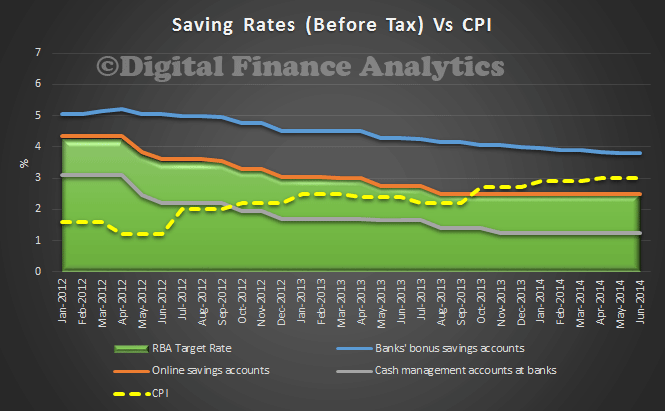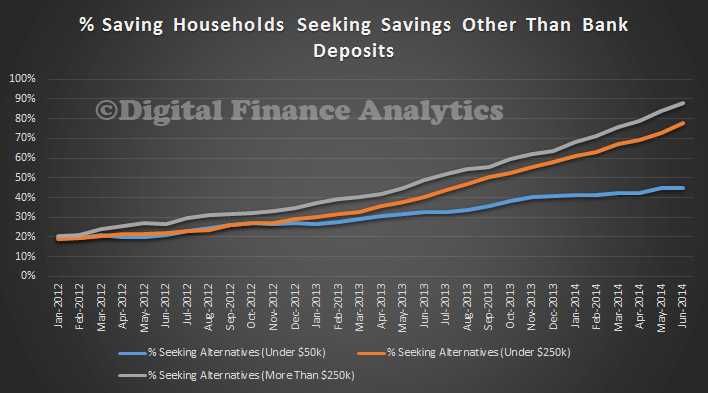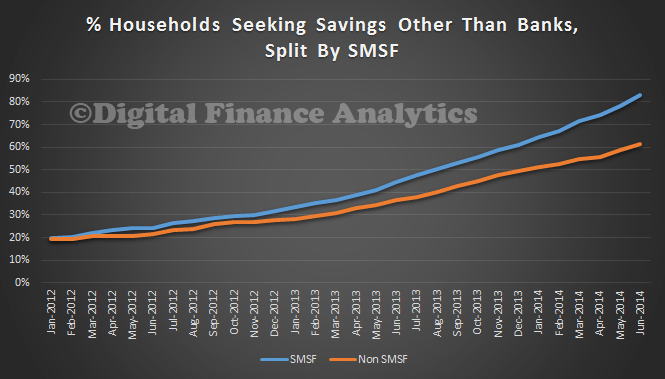Last week, the Future of Financial Advice regulations were tabled in Parliament, following the recently published Senate review. As currently incarnated they have the potential to drive a coach and horses through the original intentions of the FOFA reforms. Today we explore why this is so, and highlight some of the consequences for both the managed funds industry and investors.
First, we need to remember that according to the ABS, as at 31 March 2014, the managed funds industry had $2,338.8bn funds under management, an increase of $31.3bn (1%) on the December quarter 2013 figure of $2,307.5bn. This is the marked to market value of the overall portfolio, helped by the facts that S&P/ASX 200 increased 0.8%; the price of foreign shares, as represented by the MSCI World Index excluding Australia, increased 0.6% and the A$ appreciated 3.1% against the US$. Here is the trend chart from the ABS series.
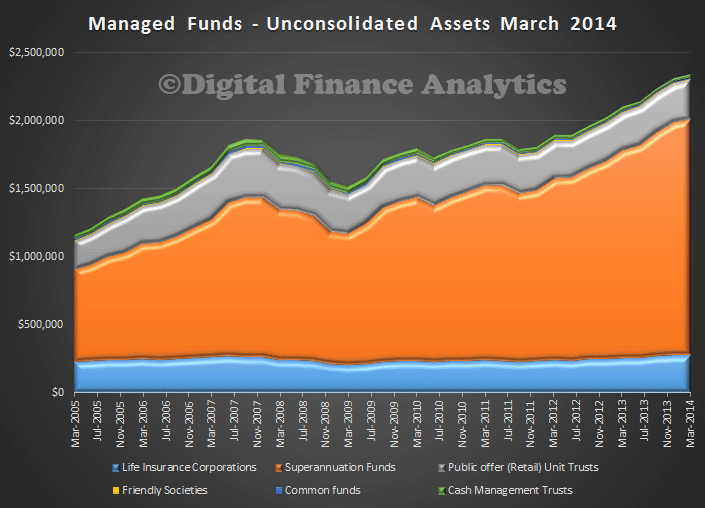 Looking at the splits by type, superannuation is the largest contributing element, with 74% of the total, or $1.706.1bn. This is not surprising seeing as we have a forced savings scheme for households.
Looking at the splits by type, superannuation is the largest contributing element, with 74% of the total, or $1.706.1bn. This is not surprising seeing as we have a forced savings scheme for households.
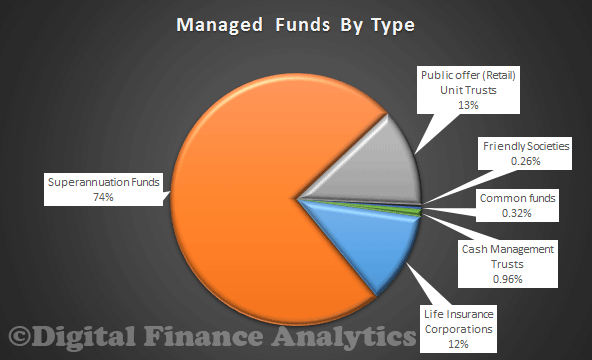 The ABS also show the industry flows in their report. Local Investment Managers have $1,520 bn invested, whilst $828.6 bn are invested with managers overseas, or directly into the market.
The ABS also show the industry flows in their report. Local Investment Managers have $1,520 bn invested, whilst $828.6 bn are invested with managers overseas, or directly into the market.
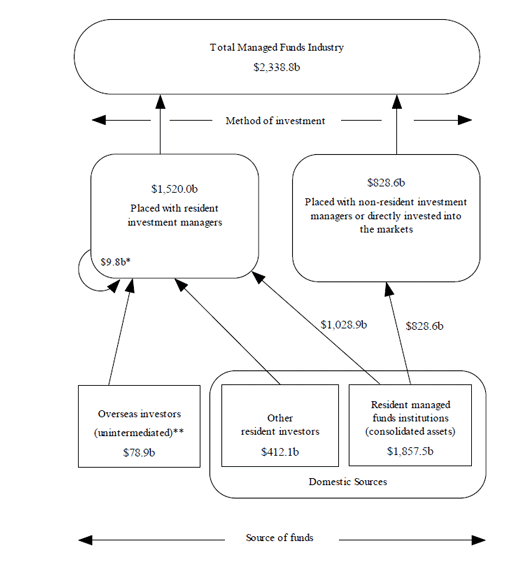 There has been considerable consolidation in the managed funds industry, looking at the managers themselves, the financial planners, and the wealth management platforms. The big banks are estimated to have about 80% of the financial planners, and are behind the bulk of the wealth management platforms and fund managers. This significant industry concentration is bad for competition, households and savers. We discussed this at length in our earlier series on superannuation. This is part of a wider consolidation within financial services, and should not have been allowed to happen, because such value chain consolidation allows a small number of players to control the industry, reduce competition and keep fees high. We recently covered the question of wealth management fees, those in Australia are significantly higher than elsewhere, despite the higher savings per capita. There have also been reports of poor or fraudulent advice to investors, where advisors recommended their own solutions, even if they were not the best for the investor concerned. Of course the original FOFA proposals was a response to this. We covered the history of FOFA up to the recent Senate Inquiry here.
There has been considerable consolidation in the managed funds industry, looking at the managers themselves, the financial planners, and the wealth management platforms. The big banks are estimated to have about 80% of the financial planners, and are behind the bulk of the wealth management platforms and fund managers. This significant industry concentration is bad for competition, households and savers. We discussed this at length in our earlier series on superannuation. This is part of a wider consolidation within financial services, and should not have been allowed to happen, because such value chain consolidation allows a small number of players to control the industry, reduce competition and keep fees high. We recently covered the question of wealth management fees, those in Australia are significantly higher than elsewhere, despite the higher savings per capita. There have also been reports of poor or fraudulent advice to investors, where advisors recommended their own solutions, even if they were not the best for the investor concerned. Of course the original FOFA proposals was a response to this. We covered the history of FOFA up to the recent Senate Inquiry here.
So, now lets look at the latest regulated changes. On 30 June 2014, the Government registered the Corporations Amendment (Streamlining Future of Financial Advice) Regulation 2014. These changes to the FoFA laws were effective from 1 July 2014, and note they are yet to be tested in the Senate, maybe the regulatory amendment approach was seen as a way to avoid scrutiny. The changes are
- to remove the Opt-In requirement;
- to require Fee Disclosure Statements (FDS) to apply prospectively – for new clients from 1 July 2013 only;
- to remove the requirement to satisfy section 961B(2)(g) (the ‘catch-all’ provision) from the best interests duty;
- to allow for scaled advice;
- to amend the grandfathering regulations in order to remove the current restrictions on trade for financial planners who may change employers/licensees, and enable fair market competition for financial planners selling their business;
- to ban commissions on investment and superannuation products, and eliminate the possibility of a re-introduction of these commissions through the previously proposed general advice exemption.
The Governments position is that financial planners will continue to provide advice in the best interests of their clients, without the catch-all provision, and that as commissions have been banned for providing general advice, (despite the fact that advisors may receive other remuneration options and bonuses), they will not be conflicted. Therefore, the changes will reduce the costs of advice, and provide greater access to potential investors.
We are not convinced. In fact, we think that the latest adjustments will lead to confusion in the industry, enable the large banks to continue their consolidation and control of the industry, and will lead to investors potentially being given poor advice.
First, it will be easy to get round the ban of commissions. The original FOFA would have outlawed financial planners working in the banks to receive any reward for suggesting their own products. In addition, any fees or commissions would have had to be disclosed. Now, planners can provide general product advice, and get rewarded. In addtion, bank tellers, and other bank employees are now able to receive bonuses for selling products under general advice, provided they have an appropriate “target” and it is not called a commission. This creates a conflict.
Second, the original FOFA did not really separate specific advice (where a planner takes the history and needs of a client, to work out what their best investment strategy might be) and general product advice, or splitting advice from product sales. Product sales were overlaid with considerable obligations and requirements, more befitting advisors. In addition, people selling products could not be rewarded for achieving sales (as happens in most sales environments). What should have happened was a clear distinction between sales and advice, with sales able to be remunerated, but advisors not. Advisors would never sell products, so could not be conflicted.
The proposed changes which the Senate Inquiry considered were to allow planners to receive a proportion of their income from product sales, with the caveat that it should be in the best interests of the client. However, now in the regulated clauses, this best interest element has gone missing. Because the best interest clause has been removed, financial planners are now able to point potential investors to their own bank products, provided they meet their savings requirements, even if they are not the best products. So, a planner has no obligation to point to the best product in the market, even if that is with a competitor.
So, the amendments as currently in the regulations, work in favour of the big banks, means that planners can remain conflicted, tellers can sell products, and the potential to release real competitive tension into the market as products would have be compared cross market (with an bias towards cheaper?) are all gone.
We can only hope the new Senate will have the chance to review and change the regulations. The really interesting question, is whether the latest round of changes reflect a poor understanding of how the wealth management industry works, or whether the big banks, protecting their own highly profitable enterprises have lobbied successfully. Remember wealth management fees in Australia are three times higher than they should be!


